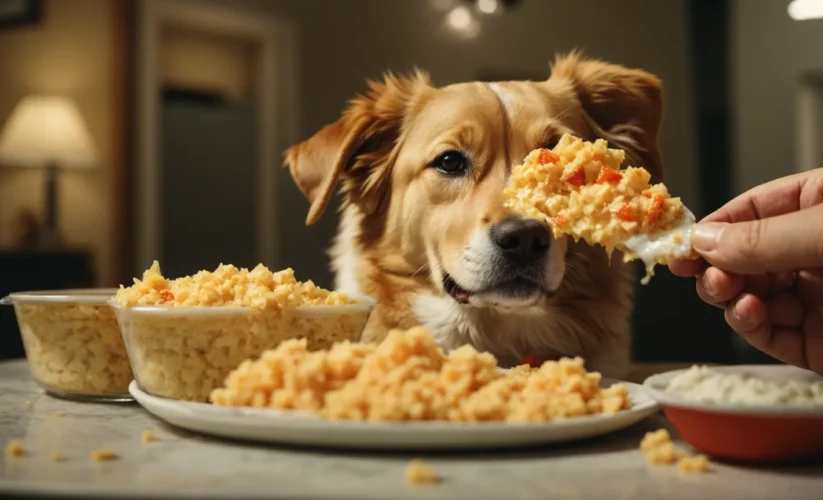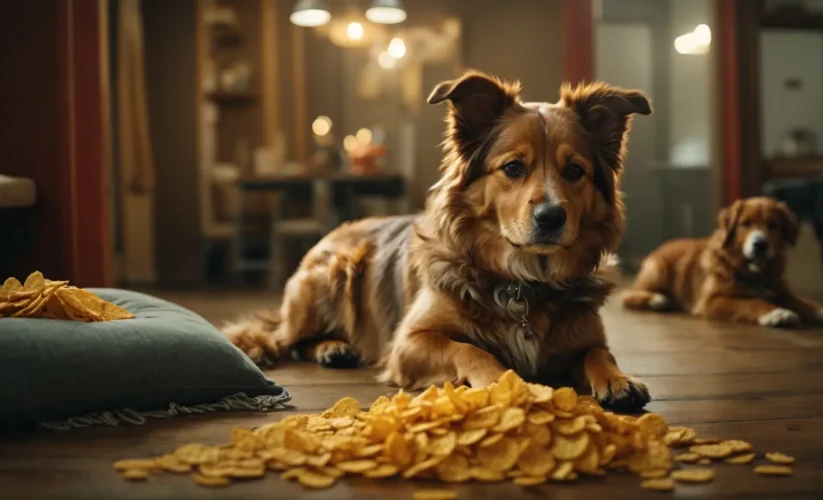Can Dogs Eat Chicken Salad?

As a seasoned dog blogger and a devoted pet parent, I’ve navigated the complexities of canine nutrition, especially concerning the question, “Can Dogs Eat Chicken Salad?” Understanding the delicate balance between what’s delicious and what’s nutritious for our furry friends is crucial. A common query among dog owners is, “Can Dogs Eat Chicken Salad?” and whether it’s safe to share human foods like chicken salad with their pets. Chicken, a staple in many households, often finds its way into our dogs’ bowls, but what about when it’s mixed in a salad? This topic isn’t just about a simple yes or no; it’s about understanding the ingredients, their effects on dogs, and finding a balance between treating and maintaining a healthy diet for our four-legged companions. In this comprehensive guide, we’ll dive into the nuances of feeding chicken salad to dogs, evaluating both the benefits and the risks. We’ll also explore other salad options that might be safer and healthier for your dog. By the end of this discussion, you’ll be equipped with the knowledge to make informed decisions about your dog’s diet, ensuring their health and happiness without sacrificing the joy of sharing a meal with them.
Is Chicken Salad Good for Dogs?
When pondering if chicken salad is beneficial for dogs, it’s crucial to dissect the components of this popular dish. Chicken, the primary ingredient, is undoubtedly a great source of protein for dogs. It provides essential amino acids, supports lean muscle mass, and is generally well-tolerated by most canines. However, the context in which chicken is served in a salad matters significantly.
In its simplest form, chicken salad might just be cooked, unseasoned chicken mixed with a few vegetables, which can be healthy for dogs. Vegetables like carrots or cucumbers are not only safe but also provide vitamins and fiber. However, most human-prepared chicken salads include ingredients that are not dog-friendly. Common additives like onions and garlic are toxic to dogs, even in small amounts. Moreover, the dressing used in chicken salads, often rich in fats, sugars, and even harmful additives like xylitol, can lead to gastrointestinal upset or more severe health issues.
The benefit of chicken salad for dogs hinges on its preparation. A plain, cooked chicken with dog-safe vegetables, devoid of any seasoning, dressing, or harmful ingredients, can be a nutritious treat. It’s a way to add variety to their diet while ensuring they receive a boost of protein and essential nutrients. However, the typical chicken salad made for human consumption strays far from this ideal.
Is Chicken Salad Bad for Dogs?
While chicken salad can have potential benefits, the risks often outweigh them, particularly when we’re talking about the store-bought or traditionally homemade varieties. The ingredients that make chicken salad flavorful for humans can pose significant health risks to dogs.
Firstly, onions and garlic, often found in chicken salads, are a major concern. These ingredients can cause oxidative damage to red blood cells in dogs, leading to anemia. Even in trace amounts, they can be dangerous, so any salad containing these should be strictly off-limits.
The dressing is another problematic component. Mayonnaise, a common ingredient in chicken salad, is high in fats, which can lead to pancreatitis in dogs, a serious and painful condition. Added sugars and salt are also harmful, contributing to obesity and other health issues. Artificial sweeteners like xylitol are extremely toxic to dogs and can cause life-threatening hypoglycemia and liver failure.
Furthermore, the concept of a “salad” for dogs extends beyond just the ingredients to include concerns about portion control and dietary balance. Dogs have specific nutritional requirements, and while chicken is beneficial, it shouldn’t be the sole component of their diet. Overfeeding, even with healthy ingredients, can lead to weight gain and nutritional imbalances.
Hence, while plain chicken and certain vegetables are healthy, the overall composition of a typical chicken salad is not suited for canine consumption. The high-fat content, dangerous additives, and potential for toxic ingredients make it a risky choice for dog owners.
Are Other Salads Safe for Dogs?
Exploring alternatives to chicken salad leads us to consider other salad options that might be safer for our canine friends. The key to dog-friendly salads is simplicity and the choice of ingredients.
Vegetable salads made with dog-safe ingredients like carrots, cucumbers, spinach, and lettuce can be a healthy treat for dogs. These vegetables provide vitamins, minerals, and fiber, supporting digestive health. However, it’s important to avoid any vegetables that are toxic to dogs, such as onions, garlic, and avocados. Also, dressings, often loaded with fats, sugars, and spices, should be avoided.
Fruit salads can also be a refreshing treat, especially during warmer months. Apples (without seeds), bananas, and blueberries are excellent choices, offering vitamins, antioxidants, and fiber. However, be mindful of fruits that are toxic to dogs, like grapes and raisins. Fruit should be given in moderation due to its sugar content, which can contribute to weight gain.
For a protein-rich alternative, a simple meat salad with cooked, unseasoned lean meats like turkey, beef, or lamb, mixed with safe vegetables, can be beneficial. This provides a good protein source without the unhealthy additives of traditional chicken salad.
When preparing salads for dogs, always consider their individual dietary needs, allergies, and any specific health concerns. Homemade salads give you control over the ingredients, ensuring that everything you include is safe and beneficial for your pet. Remember, even the safest ingredients should be given in moderation as part of a balanced diet.
Final Thoughts
Feeding your dog chicken salad, or any salad, requires careful consideration of the ingredients and their impact on canine health. While plain chicken and certain vegetables are nutritious for dogs, typical chicken salads made for human consumption are fraught with risks, from toxic ingredients to unhealthy additives.
As responsible pet parents, our goal is to provide our dogs with meals that are not only enjoyable but also nutritionally balanced and safe. This often means preparing separate, simpler versions of our meals specifically for them or choosing dog-safe alternatives. Remember, treats and human food should only complement a diet that primarily consists of high-quality commercial dog food, which is formulated to meet all their nutritional needs.
In summary, while sharing our food with our pets is a sign of love and bonding, it should always be done with their health and well-being in mind. Consult with your veterinarian before introducing new foods into your dog’s diet, and always prioritize their long-term health over the temporary joy of sharing a snack. By being mindful and informed, we can ensure our furry friends lead happy, healthy lives.










